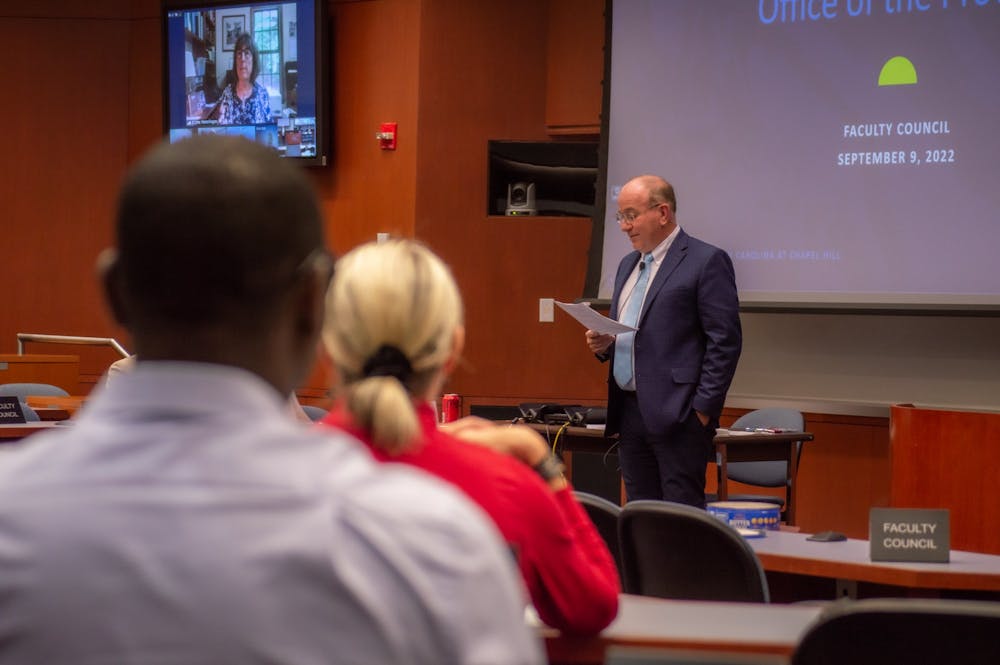As the University returns to campus for the spring semester, the Faculty Executive Committee discussed the assessment of well-being days, a rise in demand for accessibility services and University Communications.
Members also touched upon the authenticity of the campus publication The Well as well as the University's dependence on coal at their Monday meeting.
Here’s the rundown.
What’s new?
- Amy Johnson, vice chancellor for student affairs, announced that well-being days will be evaluated through the American College Health Association's National College Health Assessment (NCHA) and the senior exit survey this spring.
- Johnson said the University sends an NCHA every few years, and this year it will include two questions on the effectiveness of well-being days in supporting students’ mental health.
- Sue Estroff, professor of social medicine, said she hopes the assessment is also extended to faculty.
- Barbara Entwisle, professor of sociology, added that although she thinks there is an important health benefit to well-being days, they do extend each semester by up to a full week.
- Johnson said the Office of Student Affairs is approaching the reflection of well-being days as not an “either/or” but a “yes and...” discussion.
- “We’ve done an array of things to try to make both clinical and non-clinical resources more readily available, reduce stigma, encourage this culture of compassion and care that we spend so much time talking about,” she said.
- Simon Bloor, associate director of accessibility resources and service (ARS), presented data and other information surrounding ARS and its role at UNC.
- Bloor said ARS judges proposed accommodations based on its possibility, its plausibility of the modification, its impact on faculty, its alteration of a course and its potential for "undue burden."
- Since 2017, there has been an upward trend in the number of students receiving ARS accommodation.
- “I don’t think it’s out of line with the general population and what we might expect from witnessing greater levels of mental health, distress and help in seeking diagnoses,” Bloor said.
- The increasing trend will continue, Bloor said, as long as the established legal framework remains the same.
- “Without a greater philosophical shift, it will remain an individualized assessment and determination,” he said.
- Bloor also announced the growth in demand for accommodated testing and remote modes of attendance for in-person classes.
- Mimi Chapman, the faculty chairperson, announced devoting time at the Jan. 20 Faculty Council meeting to discuss the expansion of accessibility and accommodation for students.
- Estroff added that faculty are fighting with the architecture on campus and its lack of inclusivity and accessibility.
- “I just think it’s fundamental. And it’s not an option. It’s an obligation. It’s a responsibility,” she said.
- Kamrhan Farwell, vice chancellor of communications, presented a summation of the areas University Communications oversees and the department's goals.
- Sharpening their public message, enhancing vibrant storytelling and auditing communications to stakeholders are University Communication’s three current goals.
- “The largest part of our operation is panning out our staff members to know as much as possible about everything cool on this campus,” she said.
- Estroff commented on the toxic positivity she believes is abundant within content published by The Well, which is run by University Communications.
- “It gets to a point where I don’t even want to read it anymore because it seems inauthentic,” she said.
- Mimi Chapman ended the meeting by requesting an update on the University’s continued use of coal, specifically since the start of the pandemic.
- Anthony Charles, professor of public health, inquired about whether the University’s coal use could violate its environmental impact statement.
What's next?
The FEC will meet again on Monday, Jan. 30, from 3:00 p.m. to 5:00 p.m.



